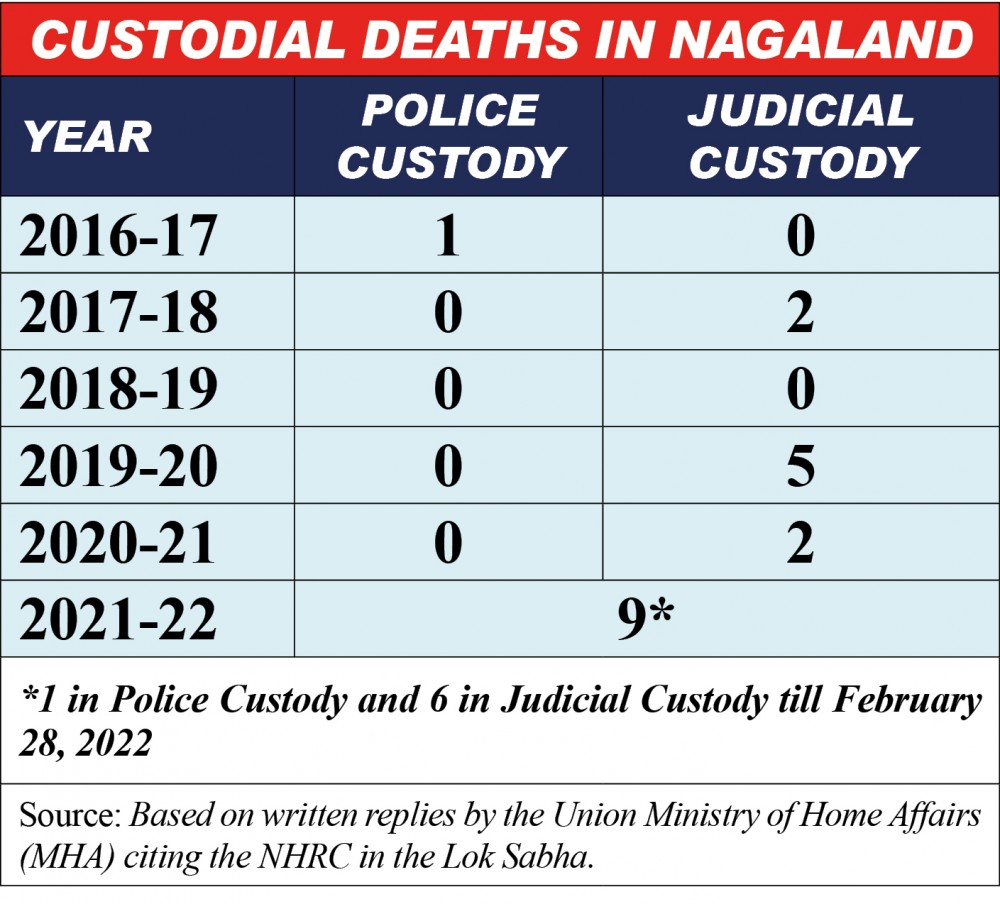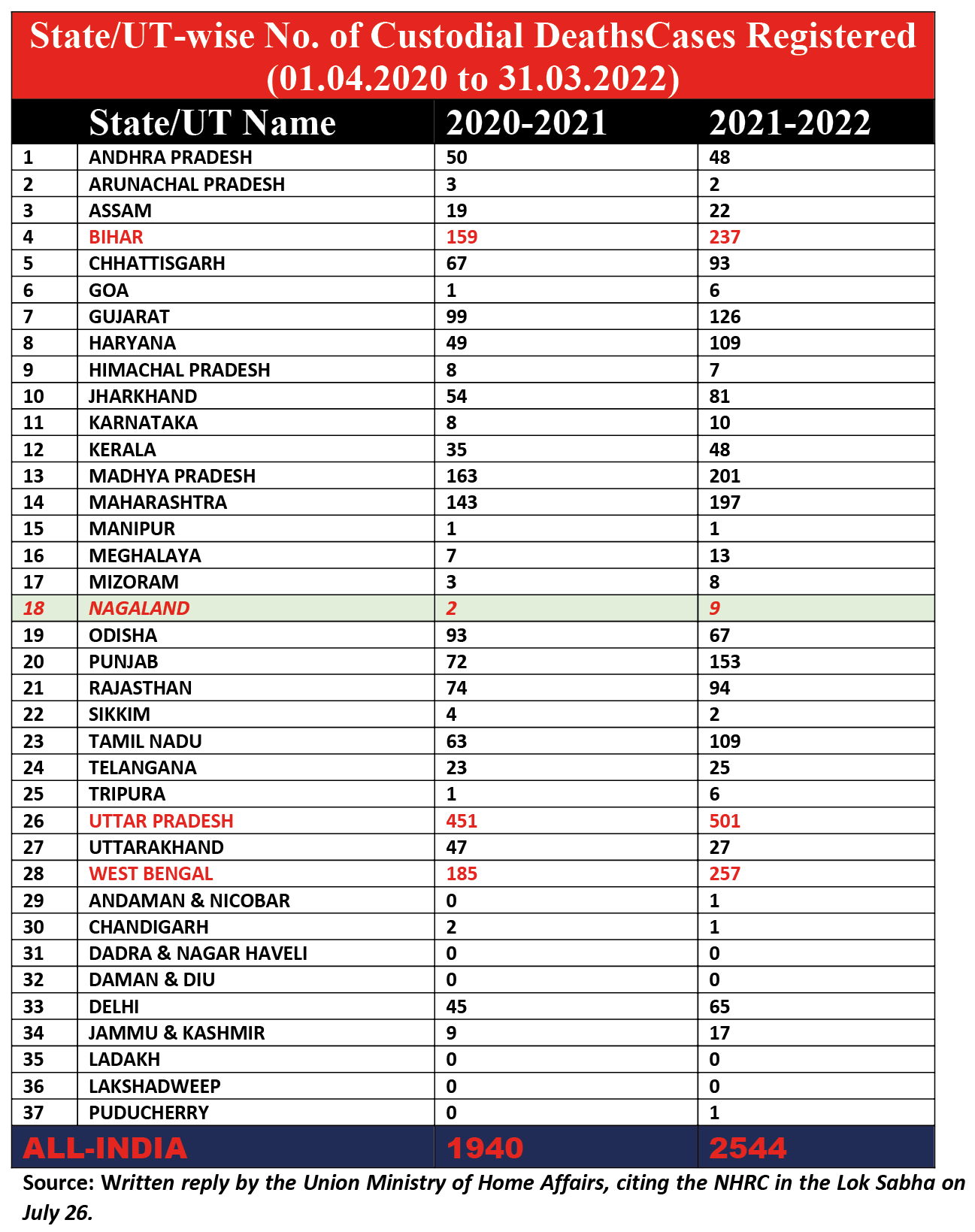
Most deaths occur in juridical custody in Nagaland
Morung Express News
Dimapur | July 31
Custodial death cases in Nagaland have been relatively ‘low’ over the years, however, it surged to its highest level in 2021-22, as per data provided by the Union Ministry of Home Affairs (MHA) in the parliament.
Citing the National Human Rights Commission (NHRC), a written reply by the Union Minister of State MHA, Nityanand Rai in the Lok Sabha on July 26 informed that custodial death in the State increased from just 2 cases in 2020-21 to 9 in 2021-22, indicating a 350% percentage increase.
This is the highest level during the last six years, as per another data on custodial death provided by the MHA.
On March 22 this year, the MHA citing the NHRC informed that the highest custodial cases in Nagaland before 2021-22 was in 2019-20 when there were five cases. The cases on other years were: 2016-17(1); 2017-18 (2); and 2018-19 (0).
Overall, the State has witnessed 19 custodial cases during the last six years.

Custodial death refers to death of a person either in police custody or judicial custody and is considered blatant misuse or abuse of power and violation of human rights, among others. Even a low level of cases, therefore, is considered concerning.
In case of the police custody, a person is usually confined within a police station while in the case of the latter; a person is kept in jail on the orders of the magistrate. Both custodies are governed by provisions under the Section 167 in The Code of Criminal Procedure, 1973.
In Nagaland, data provided by the MHA informed in March that from 2016-2017 to February 28, 2022, out of 17 custodial death cases, 15 were under judicial and 2 were under police custody.
In all the cases, there was neither disciplinary action nor persecution in Nagaland or across India, it informed.
During the last five years and the current year up to February 18, 2022, the NHRC had recommended monetary compensation for 7 cases in Nagaland amounting to Rs 13 lakh, the MHA added.
Custodial deaths across India
Meanwhile, as per the year-wise and State-wise list provided by the MHA on July 26, custodial deaths increased from 1940 in 2020-21 to 2544 up to March 31, 2022 across India.
Uttar Pradesh led the list with 501 cases, followed by 257 in West Bengal and 237 in Bihar.
The Union Territories of Dadra & Nagar Haveli; Daman & Diu, Ladakh and Lakshadweep had ‘Zero’ case during both years.
Among the North-East States, Assam had the highest custodial deaths at 19 and 22 respectively in 2020-21 and 2021-22, followed by Meghalaya recording 7 and 13 respectively, during the same period.
It was lowest in Manipur with just 2 cases in both years, followed by Arunachal Pradesh (5); Sikkim (6); Tripura (7) and Mizoram (11).
In the case of ‘Death in Police Encounter,’ the MHA’s data informed that Nagaland recorded one cases in 2020-21, while there was no death in 2021-22 up to March 31, 2022.
Across India, deaths in police encounter increased from 82 in 2020-21 to 151 deaths in 2021-22, with Jammu & Kashmir registering the highest cases at 45, followed by 30 in Chhattisgarh and 18 in Assam.
Actions taken by GoI
Meanwhile, on queries as to whether the Government of India has set up any mechanism to investigate custodial and encounter death as well as actions taken against such deaths, MoS Rai stated that “Police” and “Public Order” are State subjects as per the Seventh Schedule to the Constitution of India.
“It is primarily the responsibility of the State Government concerned to ensure protection of human rights of the citizens,” he pointed out.
However, he underlined that the Central Government issues “advisories from time to time and has also enacted the Protection of Human Rights Act (PHR), 1993, which stipulates establishment of the NHRC and State Human Rights Commissions to look into the alleged human rights violations by public servants.”
When complaints of alleged human rights violations are received by the NHRC, action is taken by the Commission as per the provisions laid down under the Protection of Human Rights Act, 1993, the MoS informed.
“Workshops/seminars are also organized by the NHRC from time to time to sensitize public servants for better understanding of human rights and, in particular, the protection of rights of persons in custody,” he added.






